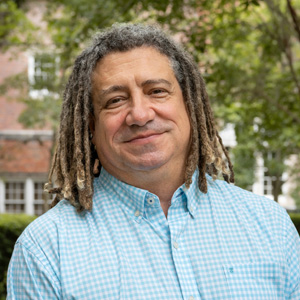| 7:45 a.m. - 8:30 a.m. |
Check-in / Light Breakfast |
| 8:30 a.m. - 8:45 a.m. |
Welcome |
| 9:00 a.m. - 9:30 a.m. Session 1 |
C. Morosan, T. Johnson - The Professor and the AI: Redefining Roles in Advanced Learning |
N. Onwuama, A. Arias-Rodriguez - Empowering Student Success: Using AI to Transform
Personal Learning Experiences Through Caring |
M. Estrada - Experiential Research through AI to Enhance Learning Dance History |
| 9:40 a.m. - 10:10 a.m. Session 2 |
E. Rodwell - Teaching Students Conversation Design for Artificial Intelligence |
M. Tejada-Simon - Leveraging GPTs to Improve Personalized Learning in Large Classrooms |
J. Kovach, A. Chatterjee - Piloting On-Demand AI Tutoring Using ‘Tailored Tutor’ in
Applied Thermodynamics |
| 10:20 a.m. - 10:50 a.m. Session 3 |
S. Tirunillai - AI-Enhanced Instructional Tools for Digital Marketing Analytics |
J. Ekeoba - Deflating the Hype: Normalizing AI Use in Higher Ed to Empower Teaching,
Learning and Research Methods |
K. Kim - AI-Powered Building Information Modeling as an Interactive Learning Platform |
| 11:00 a.m. - 11:50 a.m. Keynote/Session 4 |
Sid Dobrin - Generative Artificial Intelligence and Higher Education |
| 12:00 p.m. - 1:00 p.m. Lunch/Session 5 |
S. Gronseth, A. Itani, M. Lopez, K. Davis, S. Stokes, K. Seastrand - Escape from the
Doctor's Office: An AI-Focused Educational Escape Room in Healthcare |
M. Kraten - Employing A.I. Platforms To Create Virtual Tutor Avatars Who Are Customized
To “Fit” The Unique Learning Styles Of Each Student |
R. Brownell - Leveraging Generative AI to Evaluate Student Reflections and Improve
Teaching Effectiveness |
| 1:10 p.m. - 1:40 p.m. Session 6 |
H. Malki - Use of AWS and Nvidia Resources in Teaching Neural Networks and Machine
Learning |
E. Felvegi, M. Termezy - Leveraging Generative AI with Renewable Assignments |
M. Lee, A. DeFranco - AI-powered Hospitality Business Analytics for Prediction and
Decision Making |
| 1:50 p.m. - 2:20 p.m. Session 7 |
L. Harrison, A. Elliott - AI as a Partner in Clinical Education: From Care Plans to
Patient Simulations |
M. Ahlf, S. McNeil - Scenarios in Ethical Approaches to Generative AI in Higher Education |
J. Lee, Y. Liu - From Research to Action: Presenting Structured, Inclusive, and Reflective
Learning Environments |
| 2:30 p.m. - 3:00 p.m. Session 8 |
J. Walia - AI on a Shoestring Budget |
A. Kelly - The Use of Artificial Intelligence in Making Long Letters Short and Swirling
Ideas into Organized Thoughts |
S. Chung - Transforming Critical Visual Culture Education Through AI-Powered Hybrid
Learning |

